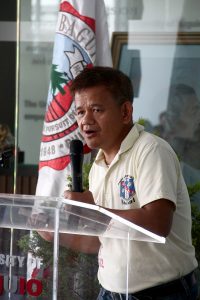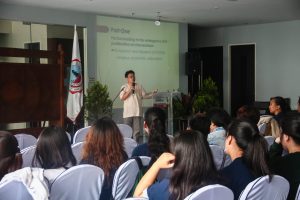Focused on the Cordilleran indigenous knowledge, systems and practices (IKSP), the University of Baguio (UB) has organized lectures held at the UB Centennial Hall last June 17.
In her opening speech, UB president Prof. Dhanna Kerina Rodas conveyed her respect for the Cordilleran culture. “I have great respect for this land and the way of life of the Cordillerans who culturally own this land,” she said, urging everyone to “protect the land.” “There is an urgent call today to protect this land. This is where generations of Cordilleran cultures have thrived. This is where Cordillerans trade, study, obtain health care, organize, [and] live. Protect your park,” she said.
Michael Umaming, Development Management Officer V of the National Commission on Indigenous Peoples – Cordillera Administrative Region, first spoke on the preservation of the Cordilleran IKSP, highlighting some guidelines in conducting research and documentation in indigenous communities.
Region, first spoke on the preservation of the Cordilleran IKSP, highlighting some guidelines in conducting research and documentation in indigenous communities.
“Indigenous cultural communities have the right to determine and decide their priorities for development affecting their lives, beliefs, institutions, spiritual well-being and the land they own,” he said. Part of the protocol is to ensure and guarantee the exercise of their right to allow or reject research and documentation of their IKSP and customary laws, he said.
Meanwhile, Dr. Gaston Kibiten, Director of the Research, Extension and Publications Office at Saint Louis University, talked about the “Politics of Clan Reunions: Ritual, Kinship and Cultural Transformation among Kankanaeys of Northern Philippines.”
“The Kankanaey clan reunions reaffirm and redeploy kinship ties, ideologies, values and practices. The novel rituals of kinship actively negotiate and mitigate the disjunctive impact of modern socio-cultural and economic configurations on the lives and relations of contemporary Kankaney kin groups. It is on this note that the organizing and performance of clan reunions come alive with political signification, as these foreground a people’s attempt to sustain and shore up a traditional but vital socio-cultural system,” he noted.
Dr. Kibiten further emphasized that the case of Kankanaey clan reunions “leads us to a renewed appreciation of the role played by ritual in cultural reproducti on and transformation.”
on and transformation.”
“Ritual is not just conservative and reproductive as it has been conventionally characterized; it is likewise active, creative and transformative,” he noted.
Papers were also presented during the activity. Some of them include the following: “Discourse Analysis of Lobon Ritual Prayer: An Antidote for Cultural Prejudice” by Dr. Jocelyn Alimondo; “The Socio-Cultural Impact of Modernization to Indigenous People through the Lens of the Cordilleran Undergraduates” by Yoshio Stevens Agapay, Patricia Floresca, Jessa Gonzales, John Phillip Paddit, and Jayvon Senot; “The Indigenous in the City: Syncretism in Rituals and Performance among Indigenous Groups in Baguio City” by Carljohnson Anacin; and “Understanding the Culture of Ifugao and Palawan through Music” by Dr. Bienvenido Constantino Jr.
The activity is part of the Luzon Culture & Arts Festival project of the University of Baguio Alumni Foundation Inc. funded by the National Commission for Culture and the Arts. – Ronalyn T. Banaken -MAP

